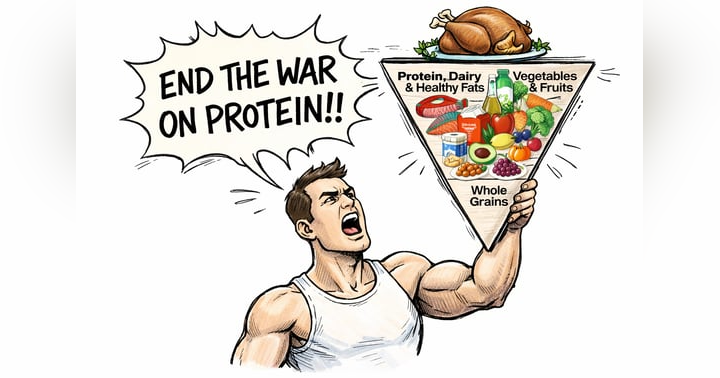Real Dairy Mythbusting Miniseries
Some patients are curious about the healthfulness of consuming dairy foods – and come to us for advice. When their questions span subjects like safety with pregnancy, lactose intolerance, young athletes and inflammation, it can be overwhelming, and (if we’re being honest), confusing! But I’ve teamed up with Real California Milk to unpack five common misconceptions surrounding real cow’s milk and provide you with the latest evidence.
Myth 1: Plant-based milk alternatives are equivalent to real cow’s milk.
As a Pediatric PA, parents sometimes tell me they don’t want to give their child cow’s milk and would rather offer a plant-based alternative. But are they nutritionally equal?
No. They aren’t.
While some plant-based beverages are fortified, they lack the complete package of real dairy milk. Real California milk has a balanced mix of energy-providing carbohydrates, high-quality protein, and healthy fats with 13 essential nutrients that are difficult to replace with plant-based alternatives – even when they have added ingredients. One serving of real milk contains 30% daily value of calcium, 20% Vitamin B12, and 25% Vitamin D.
Although real milk contains saturated fat, growing research shows it offers cardiometabolic benefits, because of a concept called the “dairy matrix” which is a term that looks beyond individual nutrients in isolation and looks at the physical structure of real dairy products, the unique blend of its nutrients, and how these components interact to influence health benefits. (read more about the dairy matrix here: PMID: 37396060)
Furthermore, real dairy is more cost-effective than plant-based options.
Grab the free beverage comparison guide from Real California milk here: https://bit.ly/3WQpFPr
Myth 2: Pregnant women should avoid dairy
This is simply not true!
In fact, without real dairy foods, eggs, seafood or iodized table salt, their current diet might not provide enough iodine to meet these increased needs.
Real dairy foods are also a natural source of Vitamin B12, which is required for the development and function of the central nervous system and healthy red blood cell formation.
Incorporating a few servings of real milk, yogurt, or cheese is not only safe, but also supports mom and baby's health during pregnancy and early development with the essential nutrients they both need.
Download the FREE guide on the benefits of dairy during pregnancy from Real California Milk: https://bit.ly/3ypxrX8
Myth 3: Dairy is unsafe for babies.
Around 6 months of age (if baby is developmentally ready for solids), real dairy is perfectly safe and should be recommended as a complementary food.
Real dairy foods like California milk, yogurt, and cheese provide 7 of 14 key nutrients for early brain development and have more bone-building nutrients than any other food group.
Dairy foods are packed with vitamins like B12 and Riboflavin which fuel proper brain development. They’re also rich in vitamin D, which promotes calcium absorption in the gut and supports proper bone growth.
Here are some suggestions for introducing dairy foods:
- Offer plain yogurt with pureed/mashed fruit
- Try soft cottage cheese or shredded cheese (perfect for 9-month-old pincer grasps)
- Pair real dairy with other nutritious foods like eggs and cheese, cereal and milk, or pureed fruits and veggies and yogurt or sour cream to encourage a varied diet.
- After 1 year, transition to whole milk for important nutrients that promote growth. Toddlers aged 1-2 years old need 1 2/3 - 2 cup servings of dairy daily to fuel their growing bodies. (1 cup serving is equal to 8 oz milk/yogurt or ½ cup cheese.)
Check out this helpful resource with free tips on safe dairy options for infants and toddlers from Real California Milk: https://bit.ly/4ccg5e7
Myth 4: Athletes shouldn't consume dairy because it causes inflammation.
Many athletes believe dairy contributes to inflammation, but research proves otherwise.
A recent review in the Journal of the American College of Nutrition (PMID: 32870744) found real dairy has neutral or even beneficial effects on inflammation. Fermented dairy products, like yogurt, might even have anti-inflammatory properties!
So, how does real California dairy support athletes?
The 3 R's of Recovery:
- Refuel: Carbs in real dairy replenish crucial energy stores after exercise.
- Rehydrate: Believe it or not, real milk might be better than water or sports drinks! The natural combo of water, electrolytes, and nutrients in milk aids rehydration and improves fluid balance.
- Repair: Real dairy boasts high-quality protein containing all nine essential amino acids. Whey protein supports muscle recovery, while casein promotes satiety and weight management.
My personal favorite tip: Low-fat chocolate milk is a delicious post-workout option. It delivers carbs and protein to refuel muscles (and it’s delicious), perfect for athletes.
So not only does real dairy not promote inflammation, but it should also be part of every athlete's nutrition plan.
Download this https://bit.ly/46vOvat
Myth 5: Lactose intolerance means you can't eat any dairy.
Lactose intolerance is a sensitivity caused by the body's difficulty digesting lactose, a natural sugar in milk. It's not an allergy!
People with lactose intolerance can still enjoy certain real dairy products if they choose options with no or low lactose content, like Cheddar, Monterey Jack, Colby Jack or Cotija cheeses.
Tolerance varies, but typically, up to 12 grams of lactose (or one cup of milk) can be consumed without significant issues.
Real dairy yogurt, especially with live cultures, can also be easier to digest as the bacteria help break down lactose. Pairing real dairy with solid foods, like milk with cereal or fruit and yogurt, slows digestion and increases tolerance.
Another option is lactose-free milk and dairy products because they are real dairy and provide the same nutritional benefits without the lactose.
The American Academy of Pediatrics recommends that children with lactose sensitivity still consume real dairy to get the essential nutrients their growing bodies need. Avoiding dairy can lead to nutrient deficiencies, especially in those at higher risk for osteoporosis and other bone-related conditions.
So, the next time a patient thinks they must avoid all dairy, remind them to try low and no-lactose dairy products.
Download this guide from Real California Milk to help you navigate dairy with your patients: https://bit.ly/3LPvQwV
Additional Resources:
Real California Milk has a Health & Wellness Professionals website that is your one-stop resource for dairy foods and nutrition research, practical tools, patient handouts and meal plans to empower you with the right information for your dairy discussions.
Check It Out! https://bit.ly/4fLyfXh
Note: This work is being done in paid partnership with Real California Milk and I am being compensated for my consultation. These opinions are mine and do not reflect those of my employer.





